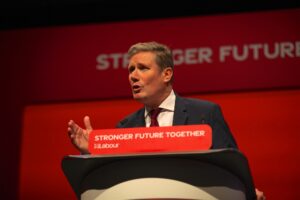 There was a time when general elections were thought of as an opportunity for serious debate about the kind of country and society we’d like to have. An election was a battle of ideas and a chance to right wrongs.
There was a time when general elections were thought of as an opportunity for serious debate about the kind of country and society we’d like to have. An election was a battle of ideas and a chance to right wrongs.
Today – with the notable exception of Scotland – there’s a weariness and cynicism about the political process and a resigned acceptance that the UK can no longer ‘afford’ the social support networks, civic infrastructure and public services it used to take for granted.
In such circumstances it becomes more important, not less, to challenge the terms of debate laid down in national political and media discourse.
So for 2015, here’s a five-point manifesto for politicians with imagination, with the promises I would like to see discussed before the vote and implemented after it.
Promise one: we will take climate change seriously
The chances of avoiding destructive global climate changes have receded through the last decade. The international climate negotiations in Paris in 2015 offer an opportunity to reverse that trend, putting in place binding targets to reduce carbon emissions.
We will recognise that climate change threatens not only our economy but society, nationally and globally, and so will put environmental justice at the heart of our policies to reduce carbon emissions. This means recognising that those hardest hit by a changing climate are the poorest and most vulnerable, both in the UK and worldwide. We’ll recognise our responsibility to those displaced by disasters and environmental degradation and support technologies and forms of social support that help them adapt.
In the UK, we will stop tiptoeing around the edges of a low carbon economy while continuing to support damaging activities in the name of growth and investment. Public funding for business and research, and public infrastructure such as roads, will be subject to a carbon test: does it help to reduce carbon emissions, either directly or indirectly, for the long term?
Promise two: we will introduce a universal basic income
To break the increasingly toxic public debate about welfare and poverty, we will challenge the idea that it is the people who experience poverty who are the problem, rather than a society that considers poverty acceptable.
A universal basic income will give everyone a sufficient income (in cash or in kind) to meet their needs for food, clothing and shelter, at a level set by an independent commission accountable to Parliament. There will be no requirement to seek work, but an expectation that any level of support above the basic income should be funded from employment.
A slimmed-down JobCentre Plus will exist solely to help people into work by sharing information about job openings and offering help with employability and skills. The benefits system will exist to help those who need additional support because of illness or disability.
A basic income will not only shift the debate about welfare, but will challenge employers to offer wages that make work worthwhile – stopping the UK’s downward spiral into a low-wage economy with increasing numbers dependent on charitable handouts.
Promise three: we will really rebalance the economy
For all the talk of northern powerhouses and rebalancing the economy, the main economic growth over recent years has been in the service sector, and the leading location of growth continues to be in London. Much of that activity has been in the business of rent extraction and property speculation. Meanwhile the biggest losers in terms of public investment have been the areas that were already most deprived.
Public funding isn’t an alternative to thriving private businesses, but in some locations it may be a necessary precondition. The regeneration programmes of the 1990s and 2000s have been condemned as unsuccessful, when for the most part they were simply unfinished. And if rebalancing is to take place, we need to remove incentives for investing in land and property where values are already inflated – which brings us to promise four.
Promise four: we will introduce land value taxation
The chance to make easy money by speculating on rising land values has been the bane of the UK economy for most of the last half-century. It encourages investors to take on debt to seek short-term capital gains, fuelling a spiral of speculation that increases social divisions and concentrates property in the hands of the already well-off. In the last forty years it has led to three successive phases of boom and bust. House prices in London rose by 229% in real terms between 1996 and 2007.
Land value taxation, as advocated by the Institute of Fiscal Studies’ Mirrlees Review, would suppress speculative gains on land rather than suppressing its economic productivity. It would make it more expensive to own land in property hotspots while encouraging investment in areas where land values are low. Parliament very nearly approved such a measure in the Budget of 1909; it was overruled then by the vested interests in the House of Lords. A century on, it is time to shift the balance of power away from landowners.
Promise five: we will revive local democracy
Most voters have given up on local politics. Last year’s local elections in England, even though combined with the European Parliament elections, registered a turnout of only 35%. The answer isn’t to concentrate power by mythologizing mayors as superheroes, but to widen participation by devolving powers, funding and representation to community level wherever appropriate.
A thriving level of truly local democracy will encourage more independent representation, removing the stranglehold of the big parties on local decision-making, while leaving city and district-level authorities free to concentrate on strategic decisions on planning and services.
Alongside a review of local government, we will examine how participatory democracy can be introduced into public services such as healthcare and education, with a greater voice for service users in decision-making and more open forms of accountability. We will ask private businesses, too, to show in their annual reports how they have reinvested in the communities they serve and insist they are accountable to the public as well as to shareholders for their activities.

















Leave a Reply